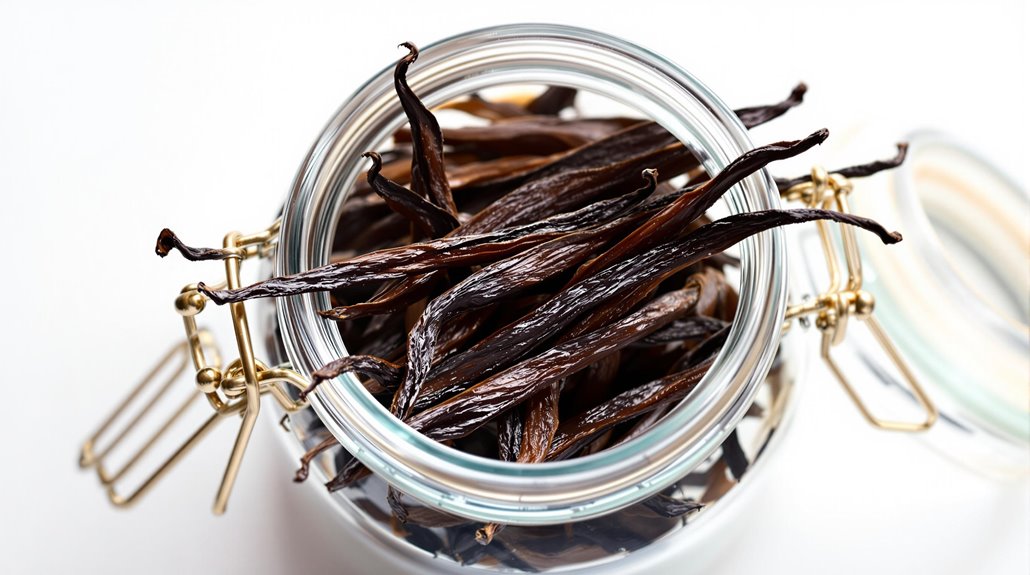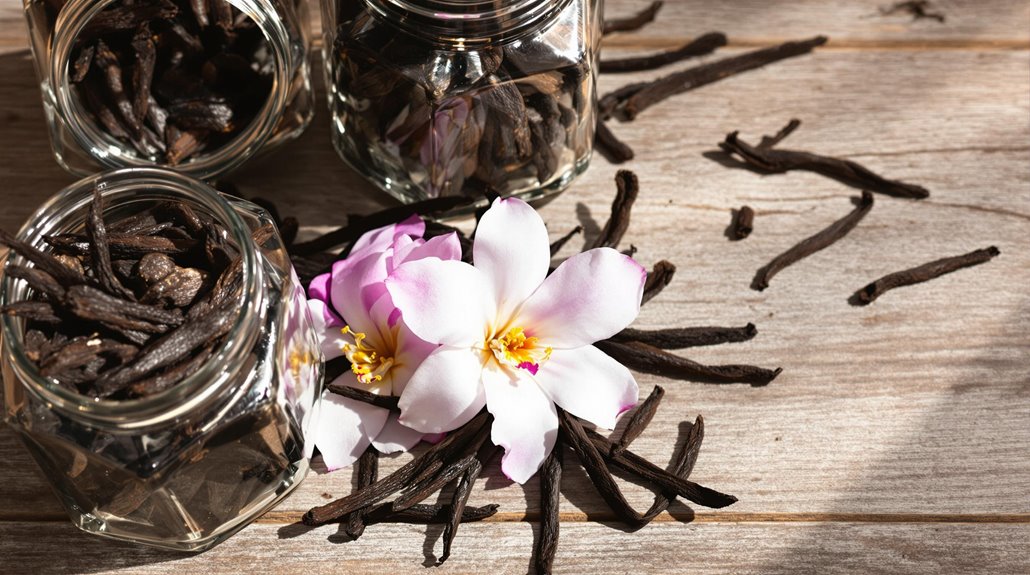What Are the Benefits of Vanilla? A Complete Overview
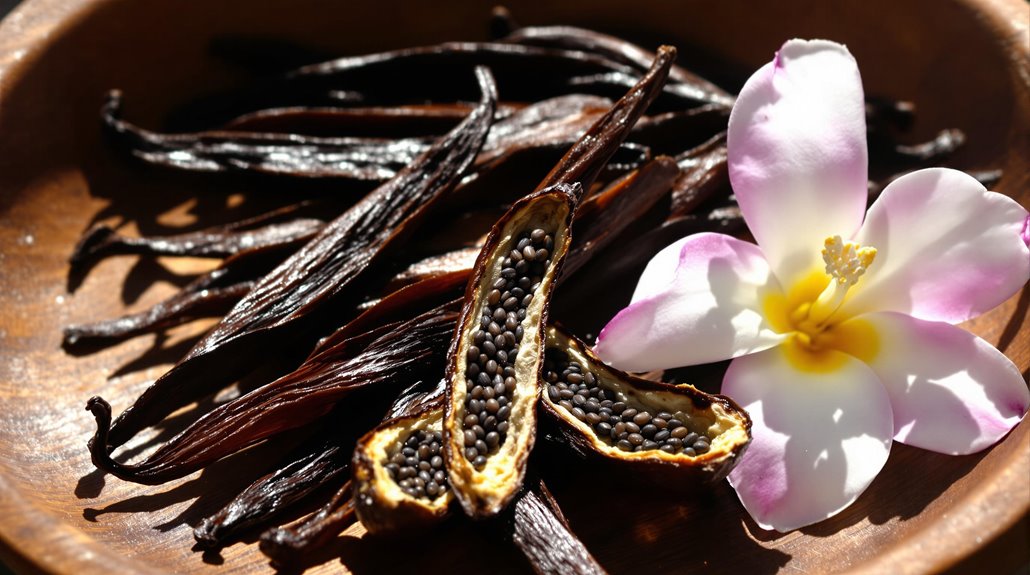
Vanilla offers you extraordinary health benefits through its bioactive compounds, particularly vanillin and vanillic acid. You'll find these compounds can elevate your mood by influencing serotonin and dopamine levels while potentially reducing anxiety and depression symptoms. Vanilla also helps manage blood sugar levels by improving insulin sensitivity and can serve as a natural sugar alternative. Its powerful antioxidant and anti-inflammatory properties help combat harmful free radicals and reduce inflammation throughout your body.
From traditional medicine to modern research applications, vanilla's therapeutic effects extend far beyond its beloved flavor and aroma. Exploring vanilla's full potential reveals even more captivating health advantages.
Understanding Vanilla's Active Compounds
Diving into vanilla's biochemistry reveals a complex array of beneficial compounds, with vanillin and vanillic acid standing at the forefront. These powerful bioactive components work together to provide numerous health benefits that you might not expect from this popular flavoring agent.
Vanillin, the primary compound that gives vanilla its distinctive aroma and taste, acts as both an antioxidant and anti-inflammatory agent in your body. What's particularly interesting is how vanillic acid provides neuroprotective benefits, as demonstrated in animal research. Together, these compounds can influence your brain chemistry by modulating serotonin and dopamine levels, which may explain vanilla's potential mood-enhancing effects.
While vanillin's bioavailability is relatively low when consumed orally, scientists have developed new formulations to improve how effectively your body absorbs and uses this compound. Beyond their effects on brain chemistry, vanilla's active compounds demonstrate impressive versatility in their therapeutic potential. Research has shown they possess antimicrobial properties and may offer anti-diabetic benefits. They've even displayed anti-cancer effects in laboratory and animal studies, though more research is needed to fully understand these mechanisms.
Mental Health and Mood Effects
The powerful compounds in vanilla don't just work at a cellular level - they can considerably impact your mental well-being too. Research suggests that vanillin, the primary compound in vanilla extract, may help combat mood disorders by naturally elevating your brain's serotonin and dopamine levels. These neurotransmitters play vital roles in regulating your emotional well-being and mental health.
Animal studies have shown promising results, with vanilla's natural compounds demonstrating potential antidepressant properties that might even surpass some conventional medications. The calming effect of vanilla isn't just folklore - scientific evidence supports its ability to reduce anxiety and depression symptoms in laboratory settings. You'll find it particularly interesting that even simply smelling vanilla can trigger positive emotional responses in both adults and newborns.
While more research is needed to fully understand how vanilla's antioxidant properties and active compounds influence human mental health, the current evidence is encouraging. If you're looking for natural ways to support your emotional well-being, vanilla's mood-enhancing potential makes it worth considering as part of your wellness routine.
Blood Sugar Management Benefits
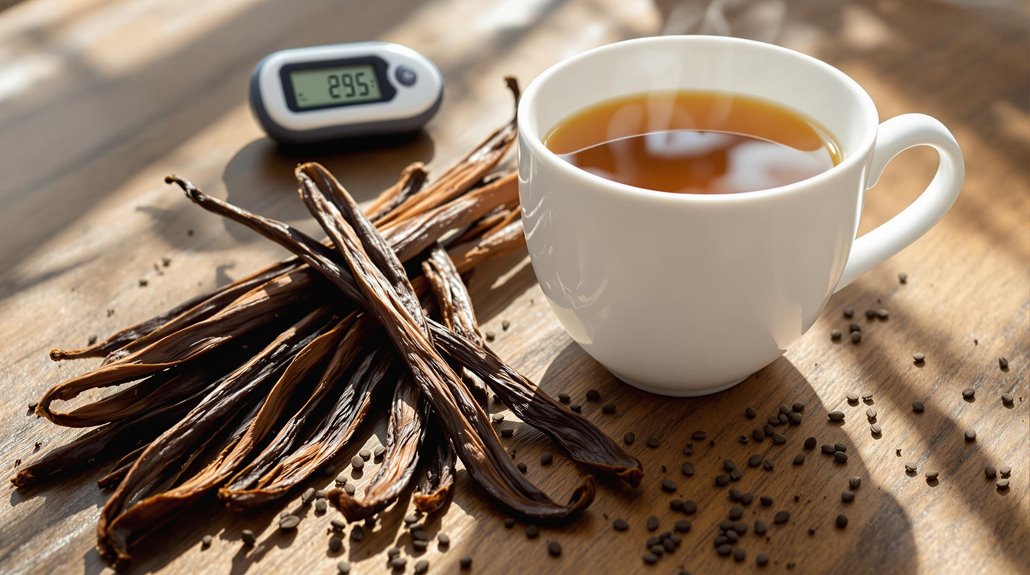
For people managing blood sugar levels, vanilla offers surprising benefits beyond its pleasant flavor. Research suggests that vanilla extract and vanilla beans contain compounds that can positively impact your blood sugar management. The natural sweetness of vanilla helps you reduce your overall sugar intake while still enjoying the sweet taste you crave in foods and beverages.
One of the key potential health benefits of vanilla comes from vanillin, its primary compound. Studies indicate that vanillin may improve your insulin sensitivity and glucose tolerance, making it easier for your body to process sugars effectively. You'll find that incorporating vanilla into your diet can help lower the glycemic index of baked goods and desserts, leading to better blood sugar control throughout the day.
Additionally, vanilla's beneficial effects extend to weight management and cardiovascular health. The vanillin in vanilla has shown promise in managing obesity and helping to maintain healthy cholesterol levels. When you're looking to reduce calories while maintaining sweetness in your recipes, vanilla's naturally low caloric content makes it an excellent alternative to sugar, supporting your overall health goals while satisfying your sweet tooth.
Antioxidant and Anti-inflammatory Properties
Powerful antioxidant and anti-inflammatory compounds in vanilla make it more than just a delicious flavoring. Natural vanilla extract contains key components called vanillin and vanillic acid that have shown impressive antioxidant activity in scientific studies. These compounds help protect your cells by fighting oxidative stress and scavenging free radicals that can damage your body's tissues.
Research has demonstrated that vanilla's anti-inflammatory effects can benefit your health in several important ways:
- Vanillin actively reduces pro-inflammatory compounds in your body, helping to control inflammation at the cellular level
- The compounds in vanilla effectively inhibit lipid peroxidation, protecting your cells from oxidative damage
- Vanilla's active components can help suppress inflammation associated with conditions like arthritis and colitis
- Both vanillin and vanillic acid work together to neutralize harmful reactive oxygen species in your system
These antioxidant and anti-inflammatory properties contribute to vanilla's broader therapeutic benefits. While more research is needed to fully understand its potential, the evidence suggests that incorporating vanilla into your diet might help support your body's natural defense systems against inflammation and oxidative stress.
Natural Pain Relief Capabilities
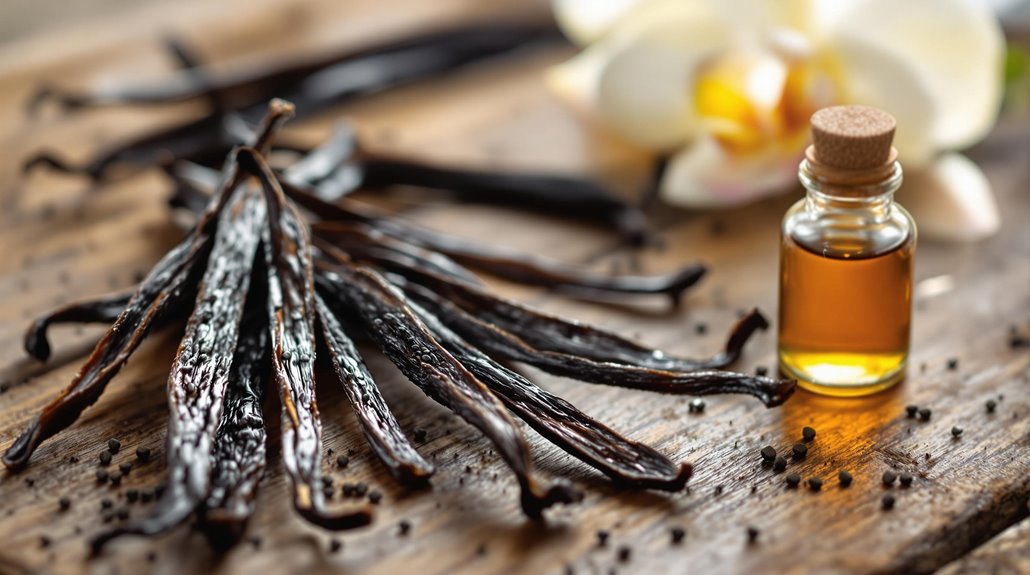
Building on its impressive anti-inflammatory properties, vanilla also shows significant potential as a natural pain reliever. Research has shown that vanillin, the primary compound in vanilla, may help reduce nerve pain and inflammation, making it a promising natural remedy for various discomfort-related conditions.
You'll find vanilla particularly useful for oral health issues, especially toothaches. The alcohol content in vanilla extract can provide temporary numbness and pain relief when applied to affected areas. Additionally, the antioxidant properties of vanillin may contribute to its healing effects on oral tissues and overall dental wellness.
While more scientific research is needed to fully understand vanilla's pain-relieving capabilities, current evidence suggests it could serve as an effective complementary therapy for managing certain types of pain. The compound's ability to address both inflammation and discomfort makes it a versatile option for those seeking natural alternatives to conventional pain management solutions. If you're dealing with mild pain or inflammation, you might consider incorporating vanilla-based remedies into your wellness routine, though it's always wise to consult with a healthcare provider before starting any new treatment approach.
Uses in Traditional Medicine
Throughout history, vanilla has played an indispensable role in traditional medicine systems across various cultures. Pure vanilla and products made from vanilla beans have been widely used to address various health conditions, from common ailments to complex disorders.
The health benefits of vanilla extend far beyond its popular culinary applications. Traditional healers have used vanilla beans and essential oil to:
- Treat fevers, muscle spasms, and menstrual cramps, demonstrating its effectiveness as a natural therapeutic agent
- Address gastrointestinal issues and blood clotting disorders, showcasing its versatility in treating internal conditions
- Help manage diabetes symptoms, as compounds in cured vanilla beans can improve glucose tolerance
- Combat various pathogens, thanks to the antimicrobial properties of vanilla products
Recent scientific studies have begun to validate many of these traditional uses. The vanillin and vanillic acid found in vanilla provide protective benefits for essential organs like the liver and kidneys. Additionally, these compounds show promise in treating sickle cell disease, supporting the wisdom of traditional medicine practitioners who've long recognized vanilla's therapeutic potential.
Research-Backed Therapeutic Applications
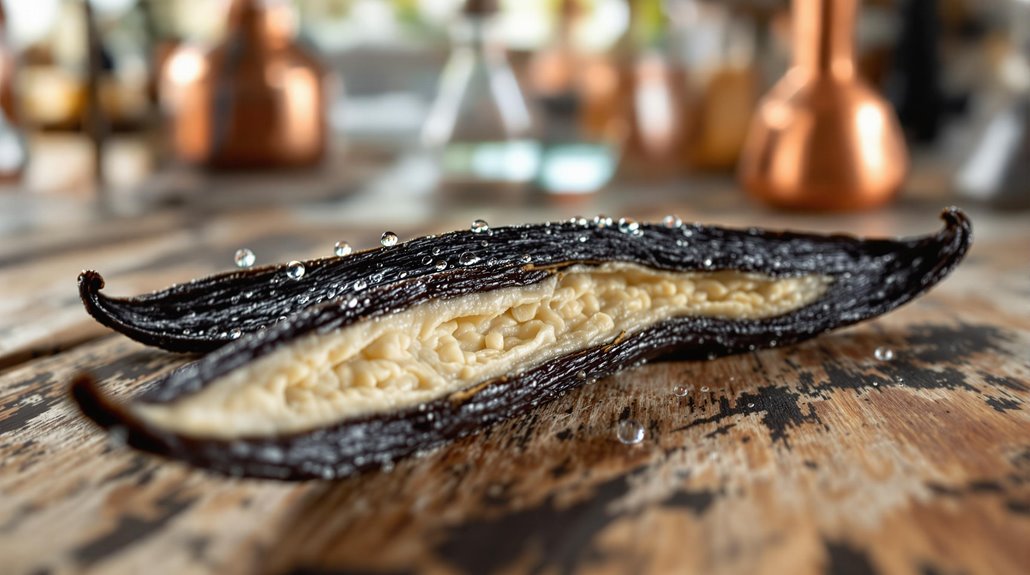
Modern scientific research has uncovered three major therapeutic applications for vanilla and its compounds, particularly vanillin. First, you'll find significant antioxidant and anti-inflammatory properties that can help protect your cells from damage and reduce inflammation throughout your body. Studies have shown these effects in both laboratory and animal tests.
Second, vanilla exhibits promising cardioprotective benefits. Research demonstrates that vanillin can help lower cholesterol levels, prevent atherosclerosis, and improve your blood pressure and endothelial function. Additionally, the compound shows antimicrobial, anti-diabetic, and anti-cancer activities, though these findings primarily come from laboratory and animal studies.
Third, vanilla's aromatic properties offer therapeutic potential through its calming and analgesic effects. When you inhale vanilla's scent, it can help relieve various conditions, including pain and certain neurological disorders. It's worth noting that while these benefits are promising, scientists are still studying vanilla's bioavailability and pharmacokinetics in humans to fully understand how your body processes and employs these beneficial compounds. Current research suggests that the way your body absorbs and metabolizes vanillin plays an essential role in its therapeutic effects.

